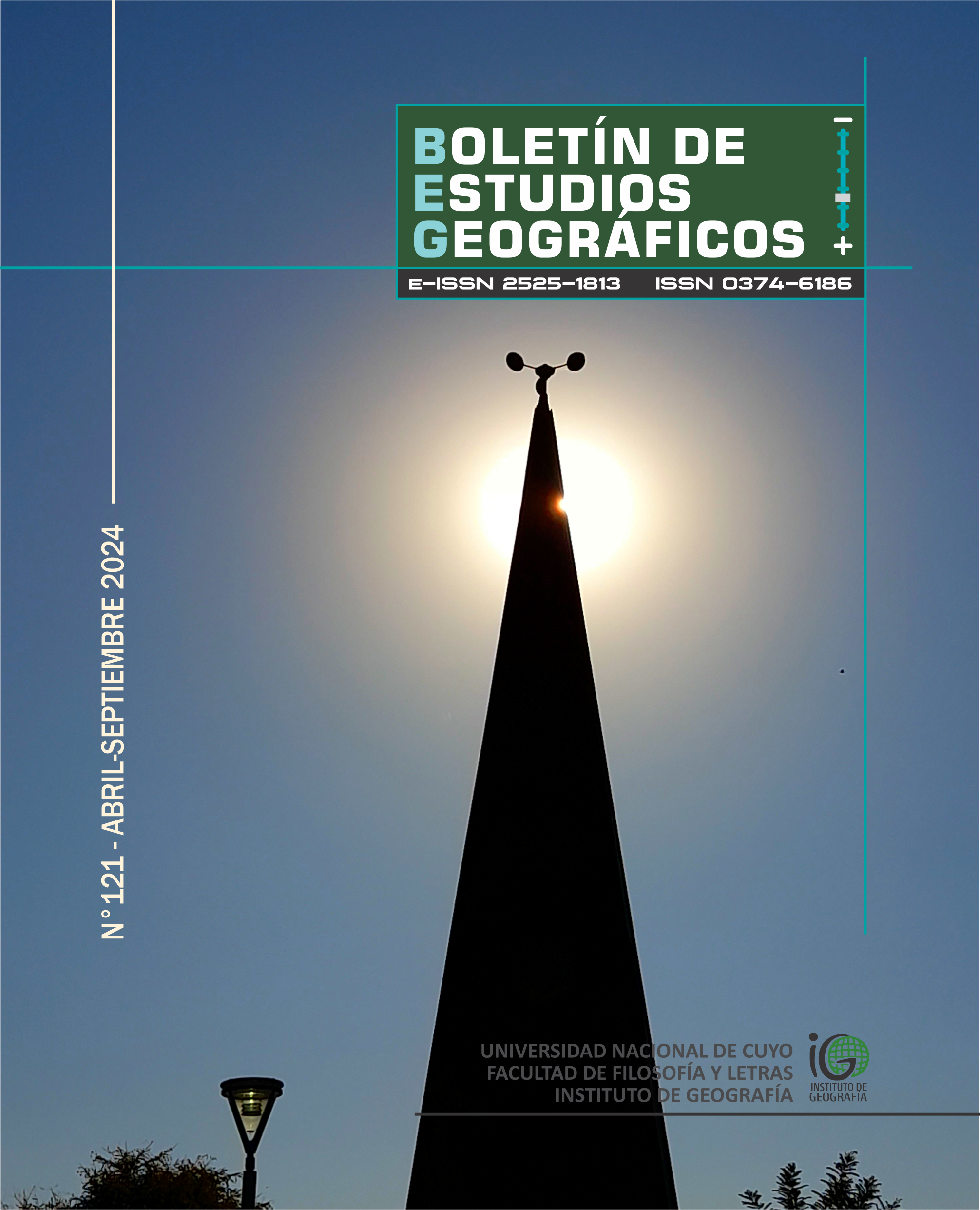GIS/Technologies and Socio-Natural Vulnerability:
A call for geographical research on the South America Andes
DOI:
https://doi.org/10.48162/rev.40.046Keywords:
Andes, geographical information systems, vulnerability, human geography, physical geography, mountain research, climate change, geospatial technologies, GISAbstract
From a selected body of publications in English, this essay explores the GIS/technologies- vulnerability relationship in order to contribute to geographical research focused on the Andes. After a brief description of the space and climatic problematic that is related to it, the articulation of these with a concept of vulnerability that has been developed throughout the current century and the analysis of case studies that research the Andean geographical system are presented. The article concludes that, within the frame of the impacts that climate change has been generating, these advances pay the way and call for the execution of comprehensive studies on vulnerability on the Andes that consider simultaneously the social, the natural and the specific space of study being investigated. Resources in terms of geospatial, conceptual, of scales and outcomes here presented can help to guide and serve as inputs in research related with the treated topic.
References
Borsdorf, A., Stadel, C., Borsdorf, A., & Stadel, C. (2015). Rural and urban settlements. The Andes: A Geographical Portrait, 155-202.
Castellanos, E. J., Lemos, M. F., Astigarraga, L., Chacón, N., Cuvi, N., Huggel, C., & Rusticucci, M. (2022). Central and South America. Cambridge University Press.
Cutter, S., Jerry, M., & Scott, M. (2000). Revealing the Vulnerability of People and Places: A case study of georgetown county, South Carolina. Annals of the Association of American Geographers, 90(4), 2000, p. 713–737.
Huddleston, B., Ataman, E., & D'Ostiani, L. (2003). Towards a GIS based analysis of mountain environment and population (Vol. 1, No. 10, pp. 2-4). Rome: FAO.
Intergovernmental Panel on Climate Change (IPCC). (2023). Climate Change 2022 – Impacts, Adaptation and Vulnerability: Working Group II Contribution to the Sixth Assessment Report of the Intergovernmental Panel on Climate Change. Cambridge: Cambridge University Press.
Lü, G., Batty, M., Strobl, J., Lin, H., Zhu, A., & Chen, M. (2018). Reflections and speculations on the progress in Geographic Information Systems (GIS): a geographic perspective. International Journal of Geographical Information Science, 33(2), 346–367. https://doi.org/10.1080/13658816.2018. 1533136
Manfré, L. A., Hirata, E., Manson, S. M., Bonsal, D. B., Kernik, M., & Lambin, E. (2015). Geographic Information Systems and Remote Sensing. In J. D. Wright (Ed.), International Encyclopedia of the Social & Behavioral Sciences: Second Edition (Vol. 10, pp. 64-68). Elsevier Inc. https://doi.org/10.1016/B978-0-08-097086-8.91027-4
Mark, Bryan, M., French, A., Baraer, M., Carey, M., Bury, J., Young, K., Polk, M., Wigmore, O., Lagos, P., Crumley, R., McKenzie, J., Lautzk, L. (2017). Glacier loss and hydro-social risks in the Peruvian Andes. Global and Planetary Change 159 61–76. http://doi10.1108/IJCCSM-06-2013-0076
Metternicht, G., Sabelli, A. & Spensley, J. (2014). Climate change vulnerability, impact and adaptation assessment: Lessons from Latin America. International Journal of Climate Change Strategies and Management. 6. 442. .http://doi10.1108/IJCCSM-06-2013-0076
Paul, S. (2013). Vulnerability Concepts and its Application in Various Fields: A Review on Geographical Perspective. Journal of Life and Earth Science, 8: 63-81. https://doi.org/10.3329/jles.v8i0.20150
Peggion¸ M., Bernardini, A. & Masera, M. (2008). Geographic Information Systems and Risk Assessment. Luxemburg: European Commission; Joint Research Centre, Institute for the Protection and Security of the Citizen.
Pinos, J., and Quesada-Román, A. (2022). Flood Risk-Related Research Trends in Latin America and the Caribbean. Water 14 (10): 1-14. https://doi.org/10.3390/w14010010
Silva, J., Shinohara, E., Giannotti, M., Larocca, A., & Quintanilha, J. (2012). An Analysis of Geospatial Technologies for Risk and Natural Disaster Management. ISPRS Int. J. Geo-Inf. 2012, 1, 166-185. https://doi.org/10.3390/ijgi1020166
Watson, R., Zinyowera, M. & Moss, R. (1998). The Regional Impacts of Climate Change: An Assessment of Vulnerability. Cambridge, Cambridge University Press.
Zapata, E. (2014). Impact Analysis of Climate Change on Andean Crops. Master's thesis in geographic information systems, Universidad San Francisco de Quito, Quito.
Downloads
Published
How to Cite
Issue
Section
License
Copyright (c) 2024 Jhon Robert Arias Hernández

This work is licensed under a Creative Commons Attribution-NonCommercial 4.0 International License.



























